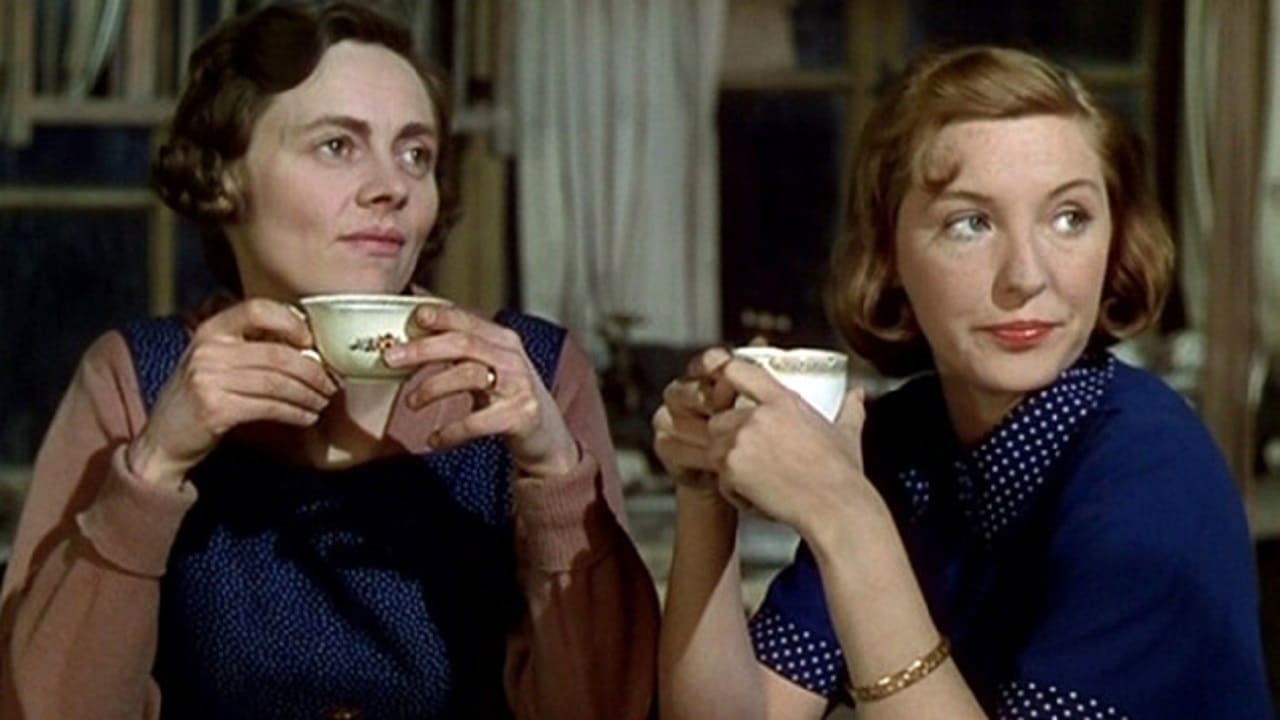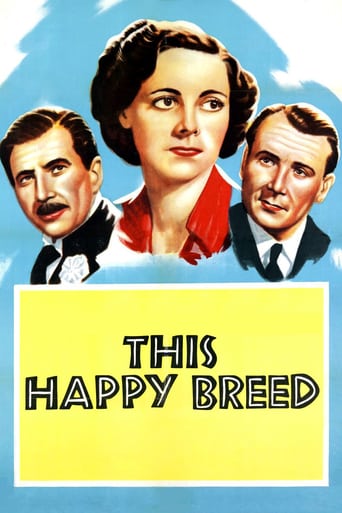

This homely classic of Noel Coward and David Lean is like a corollary to Coward's earlier masterpiece "Cavalcade" 10 years earlier from the 1890s up to the thirties, but this is more concentrated on family life only, and although it's a small world there are some human dramas in it all the same, principally enacted by Kay Walsh as the young and flippant Queenie, the problem child of the family, courted by John Mills as a sailor, who is willing to sacrifice anything for her no matter how bad she behaves.The main actors are Celia Johnson and Robert Newton, though, matched by the inimitable Stanley Holloway, and some of the best scenes are with him, particularly the long scene of the farewell letter. Celia Johnson always made stark impressions as something of the ultimate woman and mother and more so here than ever. It's to the advantage of the film that there is not much of the outside world intruding on the cozy family life. Of course, there is some political engagement by one of the sons-in-law, the great strikes make themselves noticed, there is som fascist agitation at Hyde Park Corner, but there is nothing of the great depression, and none of the great political affairs disturb the family.One of their most charming ingredients is the case of the old mother. She is always discontent and finds a perfect partner to nag with in her unmarried daughter, Celia's sister, and Robert Newton is very categorical in his final comments on her case. It's a masterstroke of Noel Coward to make such a perfectly sour and negative person appear as the most hilarious part of the story.
... View MoreDavid Lean's hallmark interwar drama, his sophomore feature movie is an adaptation of Noël Coward's play. Shot with gorgeous Technicolor felicity, THIS HAPPY BREED is a compelling slice- of-life story chronicling the vicissitude of Gibbons family from 1919 to 1939, before WWII looming large ominously in the offing. The Gibbons family settles into their new house in South London shortly after WWI, a household of seven, patriarch Frank (Newton), matriarch Ethel (Johnson), their three children: Reg (Blythe), Vi (Erskine) and Queenie (Walsh), as well as Ethel's spinster sister Sylvia (Leggatt) and their mother Ms. Flint (Veness), whose barbs-throwing schticks can never run dry even if being tediously deployed here, and both actresses have poignant moments which vouch for their affecting versatility during the film's most heartbreaking revelation. Lean hones the subsequent smarting long shot with a perversely impassive static shot, entirely banks on Newton and Johnson's reactions, he is already a dab-hand in theatricality at such an early stage! Coward's story gives an easy pass on marital hitches (a recurring beef of Ethel is Frank's drinking problem, but that is occasional and rather comically portrayed), instead, homes in on the generational gap between parents and their children, their disagreements in politics, world-views and lifestyles, a tussle between idealism (hot-blooded, revolutionary, and eager to success) and realism (the innate attributes of British's monarchical roots), an exchange between sage epigrams learned from the college named life and headstrong wishful thinking liberated through the airy-fairy unworldliness. And the POV never deflects from Frank and Ethel, because they are the emblem of mankind, benevolent, upstanding, perseverant and refuse to be squashed by adversity (this is high melodrama so to speak). Meantime, Lean nimbly slips in cardinal societal events to extract the ethos of its time, but refrains from becoming over-patriotic, because, in the end of the day, it is a tale apropos of commonality refracted through the microcosm of a family saga, and it is achieved with a remarkable equilibrium between enthusiasm and sobriety.Impressive performances a gogo, Robert Newton and Celia Johnson are unexpectedly naturalistic when handling those stagy materials - they are simply the best parents one can ever imagine to have, and Johnson in particular, excels in the role which is much senior to her real age, what a range she exhibits! Although, in the earlier segments, it is quite a stretch to believe she could be the mother of 3, since she looks barely a tad older than the three actors who play her children. Kay Walsh, as the rebellious daughter Queenie, has her own moment of grandstanding and she actually pulls off the least likable character with rather unforeseen honesty and moxie, whereas a four- square John Mills, who plays Bill Mitchell, the neighbor's son who carries a torch for her unyieldingly, is a warmth generator pops up intermittently during the family's turbulence. Finally, Stanley Holloway, who plays Bill's father Bob, Frank's comrade-in-arms, chummy and sometimes well-oiled, whenever he appears with Frank, their scenes smack of nostalgia, not of war but heart- felt camaraderie. Through and through, THIS HAPPY BREED is engaging, endearing and brilliantly touching, shorn of highfalutin artifice which might impinge on Lean-Coward's following collaboration BLITHE SPIRIT (1945).
... View MoreThis Happy Breed is a drama that follows the lives of two families over a period of 20 years between the two great wars. I found this to be one of the most enjoyable of David Leans films and one of the rare earlier ones to be filmed in colour. It boasts a top class cast that all provide good performances. I am a big admirer of Celia Johnson and she was for me the glue that binds the film together. Robert Newton shows his impressive versatility in his portrayal of a normal family fan. It also features John Mills though he doesn't have a lot to do. The film captures a number of historical moments interspersed with the normal family dramas that occur in most households. The script is tight and at times very witty. Although there is nothing earth shattering here I found it engrossing throughout and it seemed to portray accurately what life was like during this period. Although maybe dated for a younger audience, for fans of old films and a bit of nostalgia this is a real treat.
... View MoreHaving patronised the lower classes in general with "In which we serve",Mr Coward and Mr Lean do their penance and treat Londoners with genuine respect and affection with their second joint effort "This Happy Breed". Released a few days before the Invasion of Europe heralded the beginning of the end for Nazi Germany,the film appealed to a nation wearily enduring its sixth year of total war.It emphasised the basic decentness of the ordinary English family,despite all its convoluted dynamics,its temporary estrangements and affiliations and its genuine dramas and tragedies. Determinedly lower middle class Robert Newton and Celia Johnston are strict but loving parents,hard - working,honest,sure of their place in the scheme of things and determined to bring up their children with the same values. Hard though it may be to accept in these more cynical and "aware" times, they were a typical family - certainly not noticeably different from my neighbours in the 1940s. "This happy Breed" tracks 20 years of their history up to the outbreak of the war that was still raging at the time it was released. Their are sublime performances from Mr Newton,Miss Johnson and Mr Holloway but for me Miss Kay Walsh is particularly outstanding as their aspirational daughter Queenie,idolised by boy next door(John Mills - very endearing),but who has bigger fish to fry. Watching it on Filmfour last week was a profoundly affecting experience for me. The wonderful scene where the family learns of the death of their son is done off - screen as the camera lingers on the open garden doors and the bright sunlight outside,jolly music on the wireless a marvellous counterpoint to the mother's tragic scream.A bit special,that. When a slightly chastened Queenie,older but apparently not particularly wiser,returns and marries a delighted John Mills you know she is making the best of a bad job,and I shed a few tears for both of them. Although not perhaps a propaganda picture in its strictest sense,nonetheless "This Happy Breed" will have reassured Britons that their way of life was worth fighting for.
... View More